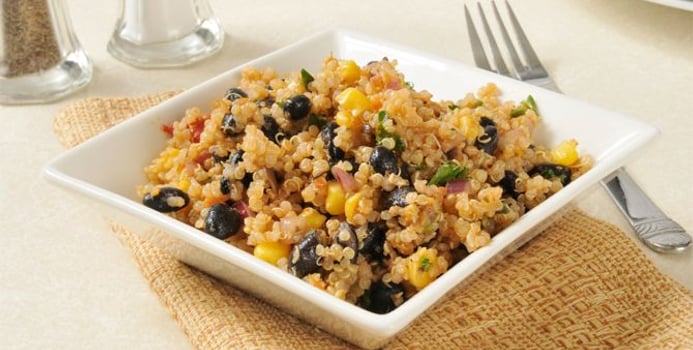Quinoa is a plant-derived protein that is similar to rice. Many people are using quinoa instead of rice or instead of meat, because it is packed with vital nutrients and is a complete protein. Quinoa was originally discovered in South America and literally means "mother grain." Quinoa is rightly named "mother grain" because of its high amino acid and vitamin content. This article discusses 5 components of the nutrition of quinoa.
1. Magnesium
Magnesium is a mineral found in quinoa which contributes to healthy blood vessels. Magnesium can relax blood vessels and increase their elasticity. Magnesium can decrease migraines and heart disease and other conditions associated with the constriction of blood vessels. Magnesium deficiency has been shown to cause hypertension, valve disease and irregular heartbeat. Eating quinoa as part of your nutrition source for magnesium can be a healthy way to prevent heart disease.
2. Riboflavin
Quinoa is rich in riboflavin, also known as vitamin B2. Riboflavin is essential for the metabolism of nutrients such as fats and carbohydrates. Like other B vitamins, riboflavin helps to increases energy. Quinoa contains approximately 21 percent of the riboflavin you need in one day. A deficiency in riboflavin can cause skin problems such as dryness and cracked lips. A riboflavin deficiency can also cause fatigue, depression and anemia. A deficiency most commonly occurs in individuals who have intestinal absorption problems or in individuals who do not consume enough vegetables.
3. Fiber
Quinoa contains 7 grams of insoluble dietary fiber. Quinoa's nutritional fiber is gluten-free, so it is easy to digest. The insoluble fiber in quinoa also reduces the secretion of bile acids; bile acids have been linked to gallbladder stones and colorectal cancer. Fiber also lowers triglycerides and blood cholesterol levels, which can improve your cardiovascular health and assist in weight loss. The fiber in quinoa leaves you feeling full, while only containing 70 calories per 100gm serving size.
4. Iron
Iron is important for building muscle and the production of hemoglobin. One serving of quinoa contains approximately 5 mg of iron, which is 37 percent of your daily iron intake. Getting enough iron is especially crucial for athletes, pregnant women and vegetarians. Even if you do eat meat, it is important to get iron from plant sources too, and quinoa is a plant rich in iron. Low levels of iron can cause fatigue and decreased immune system function.
5. Phosphorus
Phosphorus is a mineral found in plants and in quinoa. Quinoa contains 65% of the daily recommended amount of phosphorus. The main purpose of phosphorus is to promote the growth and development of healthy bones and teeth. The phosphorus nutrition contained in quinoa can be especially important for vegetarians because phosphorus is primarily found in meat. Phosphorus also plays a role in the breakdown of fats and carbohydrates.
As you can see, the nutrition in quinoa is abundant. Quinoa is also easy to cook. Simply cook quinoa in the same way that you cook rice. Quinoa has a slight nutty flavor and can be used in dishes which would otherwise call for rice or pasta.



